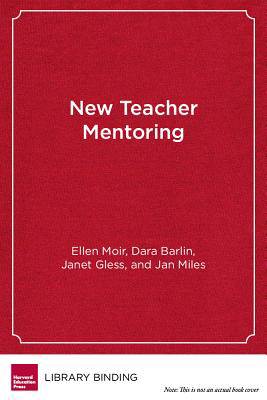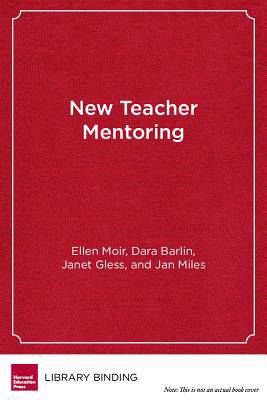
- Afhalen na 1 uur in een winkel met voorraad
- Gratis thuislevering in België vanaf € 30
- Ruim aanbod met 7 miljoen producten
- Afhalen na 1 uur in een winkel met voorraad
- Gratis thuislevering in België vanaf € 30
- Ruim aanbod met 7 miljoen producten
Zoeken
New Teacher Mentoring
Hopes and Promise for Improving Teacher Effectiveness
Ellen Moir, Dara Barlin, Janet Gless
Hardcover | Engels
€ 83,95
+ 167 punten
Uitvoering
Omschrijving
In this practical yet visionary book, Ellen Moir and her colleagues at the New Teacher Center review what current research suggests (and doesn't) about the power of welldesigned mentoring programs to shape teacher and student outcomes. Teacher quality is the single most important lever schools have for raising student achievement. A substantial body of research indicates that new teachers are less able than their more experienced colleagues to help students fulfill their academic potential. Yet in many school districts--particularly those in urban settings--as many as half of the teachers may have less than five years' experience. In addition, the students who face the greatest challenges are most likely to be assigned novice teachers. By supporting new teachers, increasing their effectiveness, and reducing turnover, school districts can give the children most in need of high-quality teaching a real chance at success. The authors set forth the principles of high-quality instructional mentoring and describe the elements of a rigorous professional development program. Detailed case studies show how these principles can be applied at the district level and highlight the opportunities and challenges involved in implementing these programs in different contexts. The book makes a powerful case for using new teacher mentoring as an entry point for creating a strong professional culture with a shared, aligned understanding of high-quality teaching. From Teachers College Record: "New Teacher Mentoring: Hopes and Promise for Improving Teacher Effectiveness should be required reading for all school district human resource directors, mentoring and induction program coordinators, and other school leaders. Moir, Barlin, Gless, and Miles provide the reader with powerful and compelling evidence for the value of high-quality mentoring programs based on their work at the New Teacher Center. They also remind the reader of the importance of the bottom line: 'When mentors help new teachers develop their skills in reaching the hearts and minds of students in the classrooms, new teachers remain in the classroom longer and are better able to help children, especially the most underserved kids, succeed at levels that defy expectation' (pp. 2-3). And isn't that what it's all about?"
--excerpt from book review in Teachers College Record, June 2010.
--excerpt from book review in Teachers College Record, June 2010.
Specificaties
Betrokkenen
- Auteur(s):
- Uitgeverij:
Inhoud
- Aantal bladzijden:
- 248
- Taal:
- Engels
Eigenschappen
- Productcode (EAN):
- 9781934742372
- Verschijningsdatum:
- 1/11/2009
- Uitvoering:
- Hardcover
- Formaat:
- Bibliotheekbinding
- Afmetingen:
- 152 mm x 229 mm
- Gewicht:
- 453 g

Alleen bij Standaard Boekhandel
+ 167 punten op je klantenkaart van Standaard Boekhandel
Beoordelingen
We publiceren alleen reviews die voldoen aan de voorwaarden voor reviews. Bekijk onze voorwaarden voor reviews.











